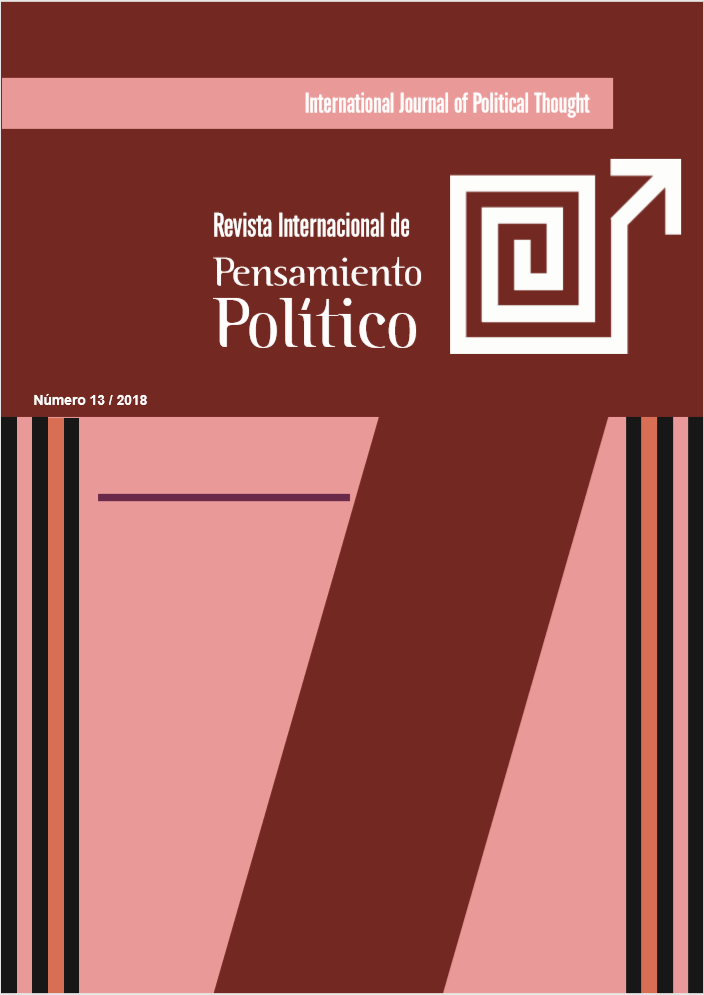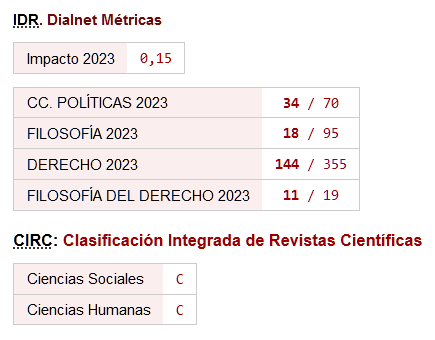Posibles vías interpretativas de constituciones misceláneas. A propósito de las constituciones de países arabo-musulmanes
DOI:
https://doi.org/10.46661/revintpensampolit.4086Palabras clave:
Constituciones, Islam, minorías, libertad religiosaResumen
Las reformas constitucionales que, cuanto menos en términos formales, recogen en varios grados las demandas sociales, reflejo del carácter plural de estas sociedades y la diversidad de proyectos políticos que se han ido gestando, dieron lugar a una miscelánea de difícil interpretación ya que ora remite al Derecho tradicional ora parece refundar el Estado a la luz de las coordenadas de corte moderno. En este panorama, puede llevarse a cabo en la práctica distintos enfoques interpretativos de las coordenadas de diferentes fuentes de inspiración, ya que las fricciones entre ambas pueden tener proyección pública, correspondiéndole al poder público afrontarlas.
Descargas
Citas
Adnane, A., “Lectura en el principio de igualdad y filiación en el derecho de familia marroquí a la luz del socialismo jurídico de Antón Menguer”, en Comentarios sobre el Derecho Civil y los pobres, Tirant Lo Blanch, Valencia, 2011.
Adnane, A., “Lecture croisée entre la Constitution marocaine et le cadre juridique de la filiation. La nécessaire levée de la discrimination dérivant de l’article 148 du Code marocain de la Famille”, Federalismi.it, Rivista de Diritto Pubblico Italiano, Comparato y Europeo, vol. 1, 2015.
Aldeeb Abusahlieh, S. A., “Le délit d’apostasie aujourd’hui et ses conséquences en droit arabe et musulman”, Revue International de Droit Comparé.
Barrero Ortega, A. La libertad religiosa en España, Centro de Estudios Políticos y Constitucionales, Madrid, 2006.
Carré, O, El Islam laico. ¿Un retorno a la Gran Tradición?, Bellaterra, Barcelona, 2000.
Cepedello Boiso, J. “Mohammed Arkoun Y La Crítica De La Razón Jurídica Islámica”, Cuadernos electrónicos de Filosofía del Derecho, vol. 24, 2011.
Cepedello Boiso, José., “Modelos de Organización política de la Umma en la historia del pensamiento islámico”, CEFD, vol. 22, 2001.
Charfi, M., El Islam y la libertad de conciencia, en MARZAL, A. (ed.), Libertad religiosa y derechos humanos, Barcelona: 2004.
El Mandjra, M. Humillación. El Islam sometido por Occidente. Estudio preliminar de Ramón Soriano, Editorial Almuzara, 2005.
Fondevila. M., “Las Constituciones árabes desde el Derecho Constitucional Comparado”, Revista General de Derecho Público Comparado, vol. 18, 2015.
Griffiths, J., “What is legal pluralism?”, Journal of Legal Pluralism, vol. 24, 1986.
Haaland Matlary, L, Derechos humanos depredados. Hacia una dictadura de relativismo, Cristiandad, Madrid 2008.
Häberle, P., “Recientes desarrollos sobre derechos fundamentales en Alemania”, Derechos y Libertades, 1993.
Habermas, J., Patriotismo constitucional, La inclusión del otro, Barcelona, Paidós, 1999.
Habermas. J., Entre naturalismo y religión. Barcelona, Paidós, 2006.
La Spina, E. “El «valor de la convivencia» como argumento fuerte y débil para la prohibición del velo integral en la jurisprudencia europea”. AFD, 2016 (XXXII).
Losano, Mario G. “Revolución en el mediterráneo: ¿Hacia un islam democrático? El problema de la libertad de religión”, Derechos y Libertades, vol. 26, Época II, 2012.
Löwenstein. K, Teoría de la Constitución, Ariel, Barcelona, 1976, pp. 216 y ss.
Lutero, M. “Sobre la autoridad secular: hasta dónde se le debe obediencia (1523)”. En Escritos políticos, Madrid, Tecnos, 1986.
Marsá Fuentes, Juan., La Globalización en el Mundo Árabe a través del Discurso de sus Intelectuales. Tesis doctoral, 2005. http://digibug.ugr.es/handle/10481/649. Fecha de la última consulta 23/11/2018.
Matthew E. Falagas, Effie A. Zarkadoulia, George Samonis. “Arab science in the golden age (750–1258 C.E.) and today”, The FASEB Journal, vol. 20, 2006.
Meyer-Bisch, P. «Les droits culturels, axes d’interprétation des interactions entre liberté religieuse et neutralité de l’Etat», en TAGLIARINI. F. (ed.), Diritti dell’uomo e libertà religiosa, Jovene Editore, Napoli 2008.
Naciri, K. “Le Dualisme Constitutionnel au Maroc“, «Les expériences constitutionnelles maghrébines», Journées d’études. Mustapha Chaker, 26 et 27 Abril 1987. Association Tunisienne de Droit Constitutionnel, Bibliothèque de Droit, de sciences politiques et économiques, Tome IX, 1987.
Ortega Y Gasset, J., Ideas y creencias, Espasa Calpe Argentina, Buenos AiresMéxico 1940.
Palazzoli «Aussi s’agit-il d’un texte fondamentalement équivoque et qui donne un peu le vertige». In «Quelques réflexions sur la révision constitutionnelle du 1er mars 1972» Palazzoli. C., R.J.P.E.M. vol. 1, 1976.
Pisani, E. “Apostasía En el Islam ¿Hacia La libertad Religiosa?” Revista Criterio, 2016.
Rhonheimer, M, Cristianismo y laicidad. Historia y actualidad de una relación compleja, Rialp, Madrid 2009.
Roca Fernández, M.J., “La neutralidad del Estado: fundamento doctrinal y actual delimitación en la jurisprudencia”, Revista Española de Derecho Constitucional, vol. 48, 1996.
Soriano, R., Sociología del Derecho, Ariel, Barcelona, 1997.
Terol Becerra, M.J, “Globalización Versus Universalización constitucional en el Mediterráneo. Propuesta metodológica para un análisis de la diversidad”, Revista de Derecho Político, vol 60, 2004.
Terol Becerra, M.J, Messaouidi, A, (coord.), El poder constituyente en el mudo árabe, Editorial Junta de Andalucía, Sevilla, 2012.
Vega Gutiérrez, A. M., “El derecho a cambiar de Religión. Consecuencias jurídicas de la pertenencia y disidencia religiosa en el derecho comparado”. IUS CANONICUM, Vol. 51, 2011.
Vega Gutiérrez. A.M., “Conversión y Derecho. La conversión religiosa en el Derecho internacional y en algunos ordenamientos jurídicos”. SCRIPTA THEOLOGICA, VOL. 42, 2010.
Voltaire. Tratado sobre la tolerancia, Fontana. Ediciones Brontes S.L., 2011.
Descargas
Publicado
Cómo citar
Número
Sección
Licencia

Esta obra está bajo una licencia internacional Creative Commons Atribución-NoComercial-CompartirIgual 4.0.
Política de acceso abierto
Se permite el acceso libre y abierto de cualquier interesado a todos los contenidos de los números de la revista, sin costo alguno, pudiendo imprimir y trasladar todos los artículos, con la única condición de precisar la fuente y la autoría.
La revista: a) no cobra a las autorías costes por el procesamiento de los artículos ni por el envío de los mismos, b) mantiene el copyright para los autores sin restricciones, c) facilita a los autores conservar sus derechos de publicación sin limitaciones.
La Revista Internacional de Pensamiento Político es una obra original del Laboratorio de Ideas y Prácticas Políticas de la Universidad Pablo de Olavide. Todos los artículos incluidos en la Revista son obra original de sus respectivas autorías. Esta Revista se ofrece libremente a la comunidad científica y académica sin coste alguno y libera los contenidos de acuerdo a la licencia "Reconocimiento-NoComercial-CompartirIgual 4.0 CC BY-NC-SA" del proyecto Creative Commons dispuesta en la siguiente url: https://creativecommons.org/licenses/by-nc-sa/4.0/legalcode
Si deseas traducir o compilar alguno de los artículos aquí disponibles, por favor, ponte en contacto













